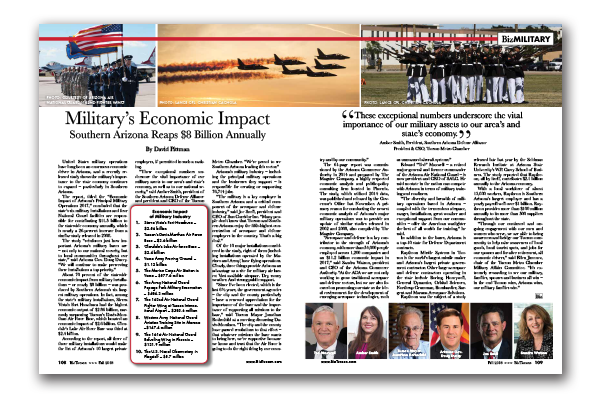
Military’s Economic Impact
By David Pittman –
Southern Arizona Reaps $8 Billion Annually
United States military operations have long been an enormous economic driver in Arizona, and a recently released study shows the military’s importance to the state economy continues to expand – particularly in Southern Arizona.
The report, titled the “Economic Impact of Arizona’s Principal Military Operations 2017,” concluded that the state’s six military installations and four National Guard facilities are responsible for contributing $11.5 billion to the statewide economy annually, which is nearly a 26-percent increase from a similar study released in 2008.
The study “reinforces just how important Arizona’s military bases are – not only to our national security, but to local communities throughout our state,” said Arizona Gov. Doug Ducey. “We will continue to make preserving these installations a top priority.”
About 70 percent of the statewide economic impact from military installations – or nearly $8 billion – was produced by Southern Arizona’s six largest military operations. In fact, among the state’s military installations, Sierra Vista’s Fort Huachuca had the highest economic output of $2.86 billion, narrowly surpassing Tucson’s Davis-Monthan Air Force Base, which boasted an economic impact of $2.6 billion. Glendale’s Luke Air Force Base was third at $2.4 billion.
According to the report, all three of those military installations would make the list of Arizona’s 10 largest private employers, if permitted in such a ranking.
“These exceptional numbers underscore the vital importance of our military assets to our area’s and state’s economy, as well as to our national security,” said Amber Smith, president of the Southern Arizona Defense Alliance and president and CEO of the Tucson Metro Chamber. “We’re proud to see Southern Arizona leading this sector.”
Arizona’s military industry – including the principal military operations and the businesses they support – is responsible for creating or supporting 76,714 jobs.
“The military is a key employer in Southern Arizona and a critical component of the aerospace and defense industry,” said Joe Snell, president and CEO of Sun Corridor Inc. “Many people don’t know that Tucson and Southern Arizona enjoy the fifth-highest concentration of aerospace and defense employees in the country. That’s a big deal.”
Of the 10 major installations considered in the study, eight of them (including installations operated by the Marines and Army) have flying operations. Clearly, three things provide Arizona an advantage as a site for military air bases: Vast available airspace. Dry, sunny weather. And strong public support.
“Since I’ve been elected, which is the last 6½ years, the government agencies – the city and the county particularly – have a renewed appreciation for the importance of the base and the importance of supporting all missions to the base,” said Tucson Mayor Jonathan Rothschild at a meeting discussing Davis-Monthan. “The city and the county have passed resolutions to that effect – that whatever missions the base wants to bring here, we’re supportive because we know and trust that the Air Force is going to do the right thing by our country and by our community.”
The 61-page report was commissioned by the Arizona Commerce Authority in 2014 and prepared by The Maguire Company, a highly respected economic analysis and public-policy consulting firm located in Phoenix. The study, which utilized 2014 data, was published and released by the Governor’s Office last November. A primary reason for conducting the newest economic analysis of Arizona’s major military operations was to provide an update of similar studies released in 2002 and 2008, also compiled by The Maguire Company.
“Aerospace and defense is a key contributor to the strength of Arizona’s economy, with more than 54,000 people employed across 1,200 companies and an $11.2 billion economic impact in 2017,” said Sandra Watson, president and CEO of the Arizona Commerce Authority. “At the ACA we are not only working to grow traditional aerospace and defense sectors, but we are also focused on promoting our state as the ideal environment for the development of emerging aerospace technologies, such as unmanned aircraft systems.”
Edward “Ted” Maxwell – a retired major general and former commander of the Arizona Air National Guard – is now president and CEO of SALC. He said no state in the nation can compete with Arizona in terms of military training and readiness.
“The diversity and breadth of military operations based in Arizona – coupled with the tremendous airspace, ranges, installations, great weather and exceptional support from our communities – offer the American warfighter the best of all worlds for training,” he said.
In addition to the bases, Arizona is a top-10 state for Defense Department contracts.
Raytheon Missile Systems in Tucson is the world’s largest missile maker and Arizona’s largest private government contractor. Other large aerospace and defense contractors operating in the state include Boeing, Honeywell, General Dynamics, Orbital Sciences, Northrup Grumman, Bombardier, Sargent and Marana Aerospace Solutions.
Raytheon was the subject of a study released late last year by the Seidman Research Institute at Arizona State University’s W.P. Carey School of Business. The study reported that Raytheon, all by itself, contributes $2.1 billion annually to the Arizona economy.
With a local workforce of about 13,000 workers, Raytheon is Southern Arizona’s largest employer and has a yearly payroll well over $1 billion. Raytheon provides more than $100 million annually to its more than 500 suppliers throughout the state.
“Through our continued and ongoing engagement with our men and women who serve, we are able to bring awareness and bridge our Tucson community to help raise awareness of local goods, local tourist spots, and jobs for our spouses and for after retirement, all economic drivers,” said Ellen Jimenez, chair of the Tucson Metro Chamber Military Affairs Committee. “It’s extremely rewarding to see our military, families, spouses and business all win – in the end Tucson wins, Arizona wins, our military families win.”





